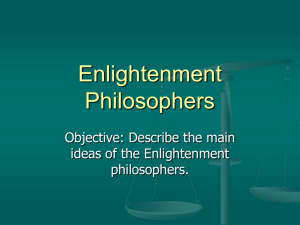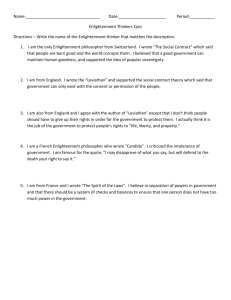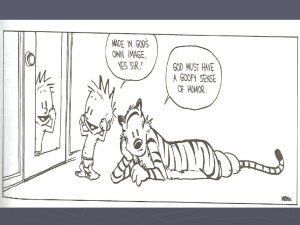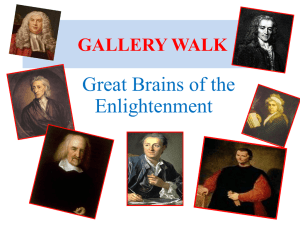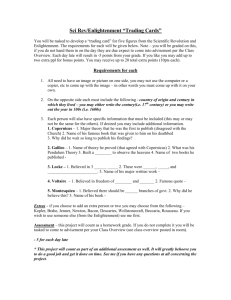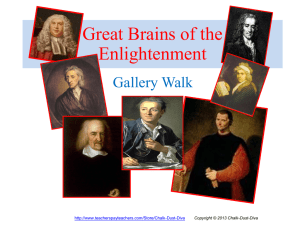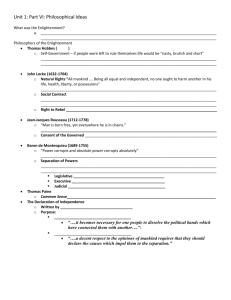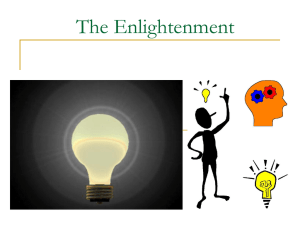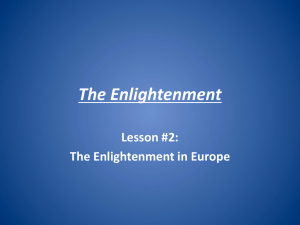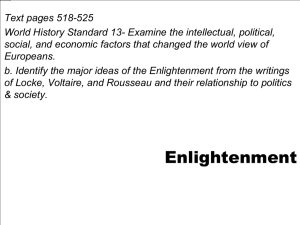Enlightenment Gallery Walk - Marion County Public Schools
advertisement
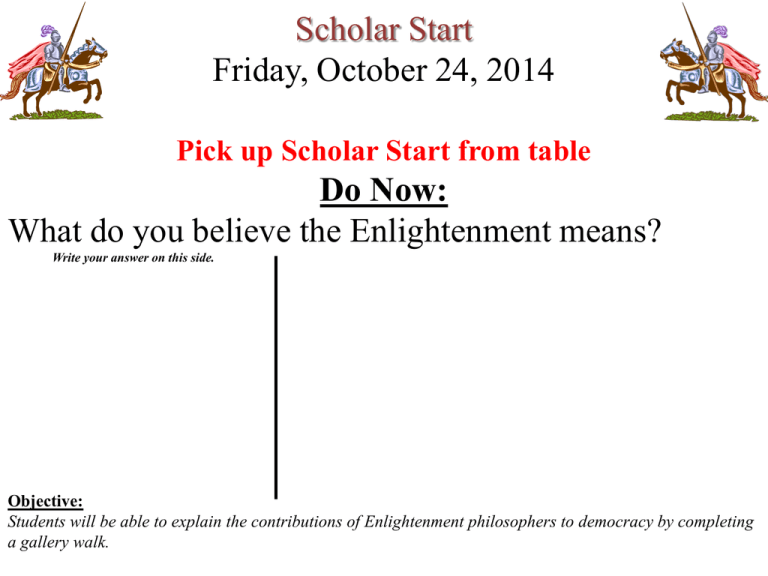
Scholar Start Friday, October 24, 2014 Pick up Scholar Start from table Do Now: What do you believe the Enlightenment means? Write your answer on this side. Objective: Students will be able to explain the contributions of Enlightenment philosophers to democracy by completing a gallery walk. Great Brains of the Enlightenment Gallery Walk Gallery Walk Instructions • STEP 1: You will be put into groups of 3-4 people. • STEP 2: Walk around the room and read the placards on the wall that describe the ideas of the important Enlightenment philosophers. (5 minutes at each station!!!) • STEP 3: Complete the corresponding worksheet: Gallery Walk – Enlightenment Philosophers. • STEP 4: When you have finished, complete the follow up questions on the back by using your gallery walk worksheet. Wrap Up Questions 1. What are the natural rights as defined by John Locke? 2. What is the social contract? 3. What is meant by “consent of the governed?” Station 1: Voltaire • A French Enlightenment writer and philosopher • Distrusted democracy • Voltaire is remembered and honored in France as a courageous man who fought for civil rights – Right to a fair trial and freedom of religion – Fought for the right of free speech – He denounced the hypocrisies and injustices of the ancient régime Station 2: Baron de Montesquieu • Wrote the Spirit of the Law • Believed that people were not naturally equal; he thought that women were inferior and that slavery was acceptable • He studied many forms of government, which led him to his idea of separation of powers • Political power should be divided between three branches of government with separate, but equal powers Station 3: Jean-Jacques Rousseau • Wrote the Social Contract • Believed that people were born good, independent, and compassionate (people left without a government = happiness) • He thought that society’s institutions (ex. Schools, arts, media, and government) brought out the worst in people • Believed in a “social contract” which is an implicit agreement among the members of a society to cooperate for social benefit where people came together and ruled themselves with direct democracy Station 4: Cesare Beccaria • Most noted essay, "On Crimes and Punishments“ • Beccaria expressed not only the need for the criminal justice system, but also the government’s right to have laws and punishments • When one chooses to live in a society, then one chooses to give up some personal liberties in exchange for the safety and comfort of a society (Social Contract) • Laws should be enlightened, rational, logical and should be the greatest good for the greatness number: – – – – – – – – Right to public trial Right to be judged by peers Right to dismiss certain jurors Right against unusual punishments Right to speedy trial Right to examine witnesses Tortured confessions are considered invalid Right to be informed of accused acts Station 5: Thomas Hobbes • Believed that people were naturally wicked, and said that they couldn’t be trusted to govern themselves • He wrote the Leviathan and argued that a monarch should have complete control (absolute monarchy) • He said that democracy couldn’t work because selfish people would always put their own interests ahead of the nation’s – People should voluntarily give power to a king who would guide the country Station 6: John Locke • Wrote The Two treaties of Government • He believed that all people could reason (think) and so they should be allowed to govern themselves • He said that governments are formed to protect the rights of the citizens (these were life, liberty, and property) • He said that the power to rule must come from the consent (agreement) of the ruled • Locke also said that because women think, they should be allowed an equal voice • He believe three key rights are life, liberty, and property Station 7: Mary Wollstonecraft • Mary Wollstonecraft was one of the first women to call for women’s rights • Wrote A Vindication of the Rights of Women • She said that women had an inferior role in society because of the environment in which they grew up, and not because women were inherently inferior • Women (and people in general) could have better lives if the education system was improved • She argued that women should be allowed to participate fully in society • Society oppresses women and the entire structure of society needed to change before there could be equality
